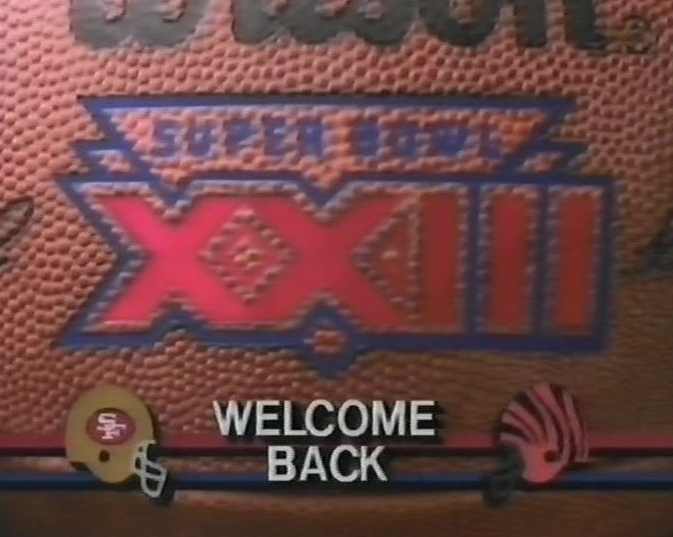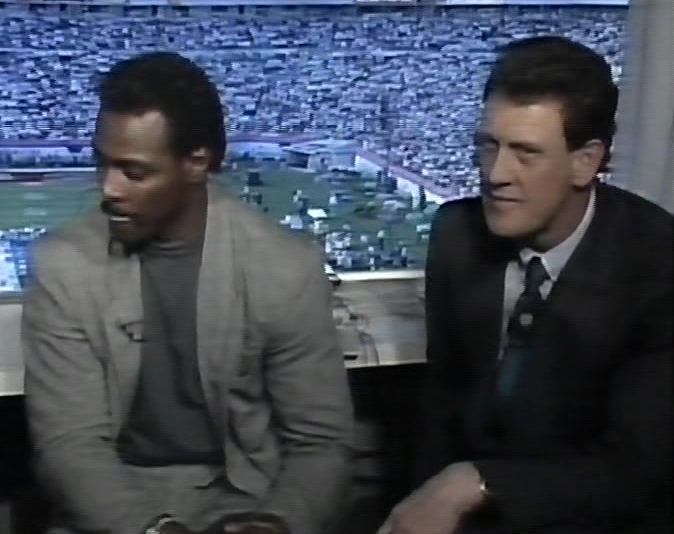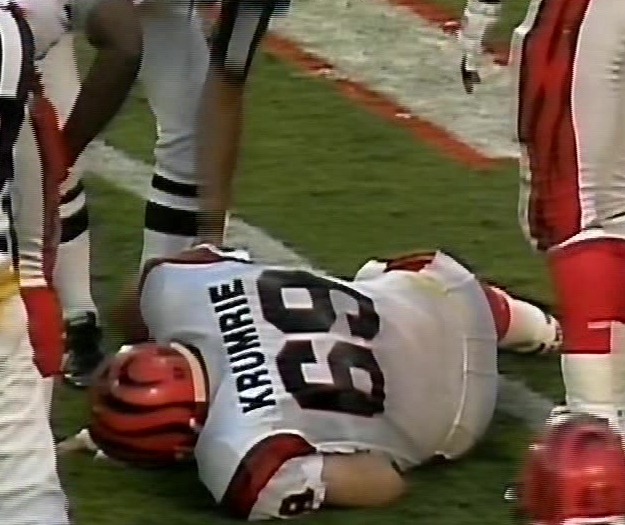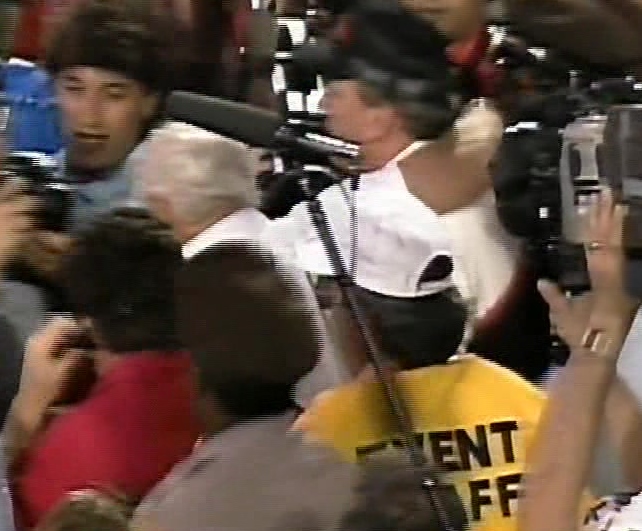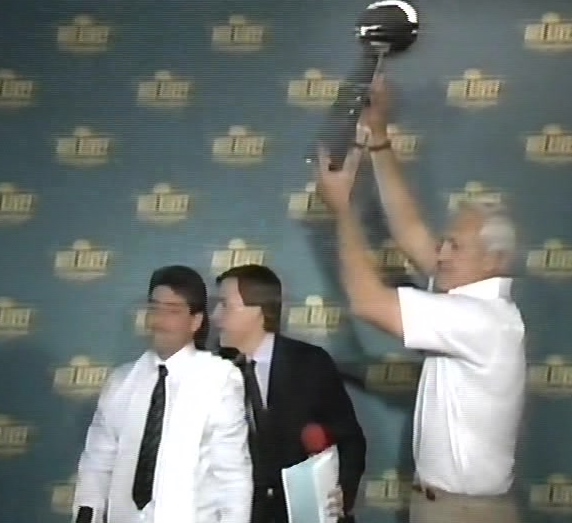Super Bowl XXIII - Bill Walsh's Last Stand And The Cementing Of The Joe Montana Legend.
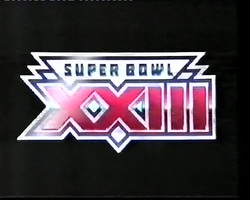
When the Cincinnati Bengals arrived in Miami to contest Super Bowl XXIII against the San Francisco 49ers, the game became more than who would be champions of the NFL, but could the student beat the mentor?
Like Skywalker returning to face Lord Vader, the Bengals’ head coach, Sam Wyche, came to south Florida to take on his old guru, Bill Walsh, only with slightly less malice and a distinct lack of light sabers.
Wyche had served under Walsh when the 49ers had won their first Super Bowl, (Super Bowl XVI), a 26-21 defeat of the aforementioned team from the Queen City. Now, as the Bengals head coach, he brought Cincinnati to face off with San Francisco in the greatest show on earth once again.
Super Bowl XXIII was broadcast live on Channel 4, on the evening of Sunday 22nd January 1989 from Joe Robbie Stadium in Miami, Florida. The game could be argued to be the first true ‘classic’ contest that NFL fans in Great Britain witnessed and certainly the finest Championship contest to that point. For television purposes the arrival of such a game was perfect. NFL great Walter Payton and ex-Patriots kicker John Smith joined Mick Luckhurst in the booth for the broadcast.
In retrospect the real storyline of the game could really be seen to be the rebirth and solidifying of the legend that now is Joe Montana – after spending much of the 1988 season with Steve Young almost literally breathing down his neck, and for much of the season, at least the perception that Walsh was itching to replace him with Young, the twenty third Super Bowl was more than just a Super Bowl, and that statement alone shows how much of a classic and important game it really was -
Like Skywalker returning to face Lord Vader, the Bengals’ head coach, Sam Wyche, came to south Florida to take on his old guru, Bill Walsh, only with slightly less malice and a distinct lack of light sabers.
Wyche had served under Walsh when the 49ers had won their first Super Bowl, (Super Bowl XVI), a 26-21 defeat of the aforementioned team from the Queen City. Now, as the Bengals head coach, he brought Cincinnati to face off with San Francisco in the greatest show on earth once again.
Super Bowl XXIII was broadcast live on Channel 4, on the evening of Sunday 22nd January 1989 from Joe Robbie Stadium in Miami, Florida. The game could be argued to be the first true ‘classic’ contest that NFL fans in Great Britain witnessed and certainly the finest Championship contest to that point. For television purposes the arrival of such a game was perfect. NFL great Walter Payton and ex-Patriots kicker John Smith joined Mick Luckhurst in the booth for the broadcast.
In retrospect the real storyline of the game could really be seen to be the rebirth and solidifying of the legend that now is Joe Montana – after spending much of the 1988 season with Steve Young almost literally breathing down his neck, and for much of the season, at least the perception that Walsh was itching to replace him with Young, the twenty third Super Bowl was more than just a Super Bowl, and that statement alone shows how much of a classic and important game it really was -
Miami however, instead of having it's focus on being a good host for the Super Bowl, had been rocked in the week leading up to the contest by race riots. In the days immediately leading up to the big game, an Hispanic police officer had shot dead a speeding black motorcyclist in Overtown in a predominantly black area of the city. The passenger on the bike, another black man, also died later. Riots subsequently swept through Overtown that night on Monday 16th January 1989. They spread quickly into Liberty City the following evening. From their hotels, some of the players claimed to the media they could see the fires raging as the violence enveloped whole neighbourhoods at a time.
More directly connected to the Cincinnati players themselves was the situation of the Bengals’ running back, Stanley Wilson, who was found in a state of distress in his hotel room the night before the game (allegedly due to cocaine use). He consequently missed the game, and was eventually suspended permanently from the NFL as it was his third time being caught using illegal substances.
The incident with Wilson at first threatened to divide the team. Wide receiver Cris Collinsworth, quietly preparing for what would be his last game, upon hearing Wyche announce the news in the team meeting sprung up and declared "We have to win this one for Stanley!"
However many others on the team did not share Collinsworth's sympathetic view and were annoyed at his comments.
During the NFL Films program "America' Game - The Missing Rings" nose tackle Tim Krumrie summed up a good portion of the team's feeling when he simply said, "It didn't mean enough to him. It didn't mean enough to him to make the right choice!"
Head coach Sam Wyche would go on to say the incident dealing with Stanley Wilson was the hardest thing he has ever had to deal with in coaching, "ever!" He had spent a lot of time helping Wilson throughout 1988, even having him over to his house after home games so the running back would not be alone after games, a time when doctors told him that this would be the running back's most vulnerable time to getting back into bad ways, as he would either be up and celebrating after a win or low and depressed after a loss.
Despite all this the Cincinnati Bengals remained together as a team and entered Joe Robbie Stadium on Super Bowl Sunday loose.
The Bengals were coming off a terrible 4-11 season in 1987, a campaign in which they began to be referred to as the Bungals due to the team letting leads get away from them late in games. Ironically the first of these, and the most painful had come at the hands of the 49ers in the second week of the season.
Leading 26-20 with seven seconds left in the game, deep in their own territory, Wyche opted to call a running play to waste the time off the clock instead of punting the ball or taking a safety, which were many people's preferred calls, including many players on his team.
The 49ers tackled running back James Brooks behind the line of scrimmage, but more to the point, there was still two seconds left on the clock. As it was a fourth down play, the clock stopped for change of possession and San Francisco took over within scoring range.
With time for one play Joe Montana took the snap, dropped back, and with apparent ease floated the ball to Jerry Rice who made the catch for the touchdown. After the extra point the 49ers had stolen the win 27-26. While the win sparked San Francisco to a 13-2 record it sent the Bengals spiralling out of control. There was a near mutiny among the players who squarley blamed Wyche for the loss. By the time the players strike had been and gone a few weeks later, Wyche had lost control of the team, and the season.
Many expected to see him fired following the season, but owner Paul Brown stuck with Wyche for the final year of his contract.
1988 saw the Bengals sprint out to 6-0 start on their way to a 12-4 record and the AFC Central title. They had one of the most complicated and fast paced offenses in the NFL that was piloted almost perfectly by Esiason.
They also had their rookie full back Ickey Woods to compliment the already established and dangerous James Brooks in the back field. Of course as the season wore on, Ickey Woods became as famous for the Ickey Shuffle as he did for his running.
Wyche stated that he knew he had a team "that could go all the way" when the Bengals defeated the defending champion Washington Redskins in the season finale 20-17 in over time. The win gave them home field advantage in throughout the playoffs.
They disposed of the Seattle Seahawks, 21-13 in the AFC Divisional round before halting the Buffalo Bills 21-10 in the AFC Championship game. In the win over Seattle the Seahawks would feign injuries in an attempt to halt the Bengals fast paced offense. Cincinnati would generally gather in their positions at the line of scrimmage with Boomer shouting out the plays. They still used most of their allowed time between plays - it was not a hurry-up offense - but because their players were ready to snap the ball within a second, the defense could not substitute.
Buffalo head coach Marv Levy even threatened to "make a farce of the game" and to have his players "fake injuries" to the NFL office, something that Wyche said Levy's players should be embarrassed about.
San Francisco's journey to the Super Bowl in 1988 was not so smooth. The year before despite their 13-2 NFL best record, they suffered a 36-24 loss at the hands of the Minnesota Vikings in what was the biggest playoff upset of the 1980s. Walsh described the loss as "the most humiliating of my life!"
After starting the 1988 season 5-2 they hit what could possibly have the been the hardest period of Walsh's coaching career. After week eleven they stood at 6-5 after consecutive losses to the Cardinals and Raiders respectively. The Cardinals loss was especially hard for Walsh after he not only saw his team give up a big lead to lose 24-23 but he also suffered broken ribs when he got caught in the action on the sideline during the game.
Both Montana and Young had been in and out of the lineup throughout the season, with Walsh stating over again that it was because "Joe was not right", or "he needed a rest" or simply "he was injured". All of which Montana, at least behind closed doors said was not the case.
It was Young who started the Cardinals game, and he looked good. The entire team did. However with the last second loss, Walsh could no longer afford to lose ground and experiment with the team's most important position. Montana was re-installed as the starter, at least while the team was still in playoff contention.
There are many, including Young himself, who think had the 49ers won the game against the Cardinals, that Montana would have remained on the bench, and NFL history could have been altered drastically.
Following the loss to the Raiders 9-3, the 49ers won their next 4 games, wrapping up the NFC West before the last game of the season. With each victory any chance Young had of claiming the starter's job was getting slimmer and slimmer.
Once in the playoffs San Francisco really were a different team than their 10-6 record showed. They demolished the Minnesota Vikings 34-9 in the Divisional Playoff, before hammering the Chicago Bears 28-3 in a freezing Soldier Field, in what Walsh described afterwards as "Montana's finest game, given the conditions and what was at stake!"
Now safe from the icy conditions of Chicago, they were in Miami, Florida on neutral ground to face the Cincinnati Bengals.
Before we look at the contest, check out the videos below. They look at the aforementioned Overton Riots - an event that all the players were well aware of as they prepared for Super Bowl XXIII.
More directly connected to the Cincinnati players themselves was the situation of the Bengals’ running back, Stanley Wilson, who was found in a state of distress in his hotel room the night before the game (allegedly due to cocaine use). He consequently missed the game, and was eventually suspended permanently from the NFL as it was his third time being caught using illegal substances.
The incident with Wilson at first threatened to divide the team. Wide receiver Cris Collinsworth, quietly preparing for what would be his last game, upon hearing Wyche announce the news in the team meeting sprung up and declared "We have to win this one for Stanley!"
However many others on the team did not share Collinsworth's sympathetic view and were annoyed at his comments.
During the NFL Films program "America' Game - The Missing Rings" nose tackle Tim Krumrie summed up a good portion of the team's feeling when he simply said, "It didn't mean enough to him. It didn't mean enough to him to make the right choice!"
Head coach Sam Wyche would go on to say the incident dealing with Stanley Wilson was the hardest thing he has ever had to deal with in coaching, "ever!" He had spent a lot of time helping Wilson throughout 1988, even having him over to his house after home games so the running back would not be alone after games, a time when doctors told him that this would be the running back's most vulnerable time to getting back into bad ways, as he would either be up and celebrating after a win or low and depressed after a loss.
Despite all this the Cincinnati Bengals remained together as a team and entered Joe Robbie Stadium on Super Bowl Sunday loose.
The Bengals were coming off a terrible 4-11 season in 1987, a campaign in which they began to be referred to as the Bungals due to the team letting leads get away from them late in games. Ironically the first of these, and the most painful had come at the hands of the 49ers in the second week of the season.
Leading 26-20 with seven seconds left in the game, deep in their own territory, Wyche opted to call a running play to waste the time off the clock instead of punting the ball or taking a safety, which were many people's preferred calls, including many players on his team.
The 49ers tackled running back James Brooks behind the line of scrimmage, but more to the point, there was still two seconds left on the clock. As it was a fourth down play, the clock stopped for change of possession and San Francisco took over within scoring range.
With time for one play Joe Montana took the snap, dropped back, and with apparent ease floated the ball to Jerry Rice who made the catch for the touchdown. After the extra point the 49ers had stolen the win 27-26. While the win sparked San Francisco to a 13-2 record it sent the Bengals spiralling out of control. There was a near mutiny among the players who squarley blamed Wyche for the loss. By the time the players strike had been and gone a few weeks later, Wyche had lost control of the team, and the season.
Many expected to see him fired following the season, but owner Paul Brown stuck with Wyche for the final year of his contract.
1988 saw the Bengals sprint out to 6-0 start on their way to a 12-4 record and the AFC Central title. They had one of the most complicated and fast paced offenses in the NFL that was piloted almost perfectly by Esiason.
They also had their rookie full back Ickey Woods to compliment the already established and dangerous James Brooks in the back field. Of course as the season wore on, Ickey Woods became as famous for the Ickey Shuffle as he did for his running.
Wyche stated that he knew he had a team "that could go all the way" when the Bengals defeated the defending champion Washington Redskins in the season finale 20-17 in over time. The win gave them home field advantage in throughout the playoffs.
They disposed of the Seattle Seahawks, 21-13 in the AFC Divisional round before halting the Buffalo Bills 21-10 in the AFC Championship game. In the win over Seattle the Seahawks would feign injuries in an attempt to halt the Bengals fast paced offense. Cincinnati would generally gather in their positions at the line of scrimmage with Boomer shouting out the plays. They still used most of their allowed time between plays - it was not a hurry-up offense - but because their players were ready to snap the ball within a second, the defense could not substitute.
Buffalo head coach Marv Levy even threatened to "make a farce of the game" and to have his players "fake injuries" to the NFL office, something that Wyche said Levy's players should be embarrassed about.
San Francisco's journey to the Super Bowl in 1988 was not so smooth. The year before despite their 13-2 NFL best record, they suffered a 36-24 loss at the hands of the Minnesota Vikings in what was the biggest playoff upset of the 1980s. Walsh described the loss as "the most humiliating of my life!"
After starting the 1988 season 5-2 they hit what could possibly have the been the hardest period of Walsh's coaching career. After week eleven they stood at 6-5 after consecutive losses to the Cardinals and Raiders respectively. The Cardinals loss was especially hard for Walsh after he not only saw his team give up a big lead to lose 24-23 but he also suffered broken ribs when he got caught in the action on the sideline during the game.
Both Montana and Young had been in and out of the lineup throughout the season, with Walsh stating over again that it was because "Joe was not right", or "he needed a rest" or simply "he was injured". All of which Montana, at least behind closed doors said was not the case.
It was Young who started the Cardinals game, and he looked good. The entire team did. However with the last second loss, Walsh could no longer afford to lose ground and experiment with the team's most important position. Montana was re-installed as the starter, at least while the team was still in playoff contention.
There are many, including Young himself, who think had the 49ers won the game against the Cardinals, that Montana would have remained on the bench, and NFL history could have been altered drastically.
Following the loss to the Raiders 9-3, the 49ers won their next 4 games, wrapping up the NFC West before the last game of the season. With each victory any chance Young had of claiming the starter's job was getting slimmer and slimmer.
Once in the playoffs San Francisco really were a different team than their 10-6 record showed. They demolished the Minnesota Vikings 34-9 in the Divisional Playoff, before hammering the Chicago Bears 28-3 in a freezing Soldier Field, in what Walsh described afterwards as "Montana's finest game, given the conditions and what was at stake!"
Now safe from the icy conditions of Chicago, they were in Miami, Florida on neutral ground to face the Cincinnati Bengals.
Before we look at the contest, check out the videos below. They look at the aforementioned Overton Riots - an event that all the players were well aware of as they prepared for Super Bowl XXIII.
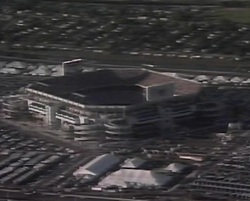
Joe Robbie Stadium at Super Bowl XXIII
The breeze on the field was relatively strong as game time approached. By the time it had carried Billy Joel’s rendition of the Star Spangled Banner around Joe Robbie Stadium, the crowd’s and the teams anticipation was equally as strong. The entire field was covered in shade, and the colours of the bright green field as a backdrop to the white of Cincinnati and the cherry red of the 49ers under the stadium lights shone brightly.
The two teams took the field and prepared for the twenty-third installment of Super Sunday.
Before the opening quarter of Super Bowl XXIII though, the dynamics of the game changed again with two major injuries on each side.
On only the third play from scrimmage, San Francisco’s left tackle, Steve Wallace fractued his ankle, as Montana was pushed into him as he let a pass go. Just nine plays later, with San Francisco pinned deep in their own territory, Cincinnati’s Tim Krumrie broke his leg as he made a tackle on running back Roger Craig. Although Krumrie was considered the heart of the Bengals defense, his replacement, rookie David Grant, proved to do an excellent job in his absence. However there is still no question that the loss of Krumrie was huge for the Bengals.
Years later Krumrie would speak of how he blamed himself for the injury and how he was "too excited" and "had too much adrenaline!" Krumrie's assessment is harsh to say the least. In truth he was simply coming off his block and reached to halt running back Roger Craig. In doing so he misplanted his leg. He made the tackle, but as the replay showed, by the time he was rolling over to his back clinging on to Craig's waist, his leg was literally dangling just above the ankle.
From the sideline, Boomer Esiason, along with the entire Bengals players and staff looked on in horror.
"It looks bad man!" quipped Boomer to his head coach. Wyche just stared helplessly mouthing the words "Get up! Get up baby!"
Perhaps NBC colour commentator Merlin Olsen summed it up best. As Krumrie was being wheeled from the field, Olsen let out to the TV audience, "You work so hard to get here, and now it's over! For him!"
Krumire was taken from the field on a cart with his leg in a blow up splint. looking more in shock than in pain. However even when injured and out of the game, his actions still helped to motivate his teammates. He was still the heart of the defense, even if he wasn't on the field.
Krumrie refused to go to the hospital once inside the locker room. The doctors told him that if he refused to go then they would have to set and cast the leg there. Upon being told that painkillers would make his memory groggy, Krumrie refused the medicine, but agreed to having the leg cast. He bit down on a rolled up towel and had the medical crew set the leg. He then continued to watch the game from the locker room, without medication and only the pain of the broken leg.
When his teammates came in at halftime they were amazed and touched by the site of their fallen comrade, urging them on from his sickbed. In the post game interviews, minutes after the agonising defeat, Esiason offered , "I said I would get him (Krumrie) a ring. I hope he doesn't make me buy one!", a slightly forced smile on an otherwise dejected and sickened face.
Not that Steve Wallace's injury was less of a factor to the 49ers - at least in the short term. On the very next play following the big tackle's exit, Bengals' safety David Fulcher came screaming through the middle of the line exactly where Wallace would have been. Montana ducked to avoid the hit and fell to the ground relatively untouched, but it was still a sack for Cincinnati.
With such major injuries hitting both teams early, the game developed an atmosphere of each team awaiting the other one to make the mistake, something that went against Bill Walsh’s repeated phrase to his team of “beating them to the punch!”.
This was refelcted in the haftime score, which was deadlocked at 3-3.
San Francisco had moved the ball well in periods and had missed an almost sure field goal late in the second quarter. They really should have been ahead at this stage.
The trend continued into the third quarter with the score tied at 6-6, each team realising the first mistake could be all it took to lose the game. Late in the third period, it appeared San Francisco had made that mistake.
It seemed Cincinnati had beat them to the punch.
Before we look at the second half, check out the short video below. It looks at Super Bowl injuries, but has particular in-depth analysis of the injury sustained by Tim Krumrie.
The two teams took the field and prepared for the twenty-third installment of Super Sunday.
Before the opening quarter of Super Bowl XXIII though, the dynamics of the game changed again with two major injuries on each side.
On only the third play from scrimmage, San Francisco’s left tackle, Steve Wallace fractued his ankle, as Montana was pushed into him as he let a pass go. Just nine plays later, with San Francisco pinned deep in their own territory, Cincinnati’s Tim Krumrie broke his leg as he made a tackle on running back Roger Craig. Although Krumrie was considered the heart of the Bengals defense, his replacement, rookie David Grant, proved to do an excellent job in his absence. However there is still no question that the loss of Krumrie was huge for the Bengals.
Years later Krumrie would speak of how he blamed himself for the injury and how he was "too excited" and "had too much adrenaline!" Krumrie's assessment is harsh to say the least. In truth he was simply coming off his block and reached to halt running back Roger Craig. In doing so he misplanted his leg. He made the tackle, but as the replay showed, by the time he was rolling over to his back clinging on to Craig's waist, his leg was literally dangling just above the ankle.
From the sideline, Boomer Esiason, along with the entire Bengals players and staff looked on in horror.
"It looks bad man!" quipped Boomer to his head coach. Wyche just stared helplessly mouthing the words "Get up! Get up baby!"
Perhaps NBC colour commentator Merlin Olsen summed it up best. As Krumrie was being wheeled from the field, Olsen let out to the TV audience, "You work so hard to get here, and now it's over! For him!"
Krumire was taken from the field on a cart with his leg in a blow up splint. looking more in shock than in pain. However even when injured and out of the game, his actions still helped to motivate his teammates. He was still the heart of the defense, even if he wasn't on the field.
Krumrie refused to go to the hospital once inside the locker room. The doctors told him that if he refused to go then they would have to set and cast the leg there. Upon being told that painkillers would make his memory groggy, Krumrie refused the medicine, but agreed to having the leg cast. He bit down on a rolled up towel and had the medical crew set the leg. He then continued to watch the game from the locker room, without medication and only the pain of the broken leg.
When his teammates came in at halftime they were amazed and touched by the site of their fallen comrade, urging them on from his sickbed. In the post game interviews, minutes after the agonising defeat, Esiason offered , "I said I would get him (Krumrie) a ring. I hope he doesn't make me buy one!", a slightly forced smile on an otherwise dejected and sickened face.
Not that Steve Wallace's injury was less of a factor to the 49ers - at least in the short term. On the very next play following the big tackle's exit, Bengals' safety David Fulcher came screaming through the middle of the line exactly where Wallace would have been. Montana ducked to avoid the hit and fell to the ground relatively untouched, but it was still a sack for Cincinnati.
With such major injuries hitting both teams early, the game developed an atmosphere of each team awaiting the other one to make the mistake, something that went against Bill Walsh’s repeated phrase to his team of “beating them to the punch!”.
This was refelcted in the haftime score, which was deadlocked at 3-3.
San Francisco had moved the ball well in periods and had missed an almost sure field goal late in the second quarter. They really should have been ahead at this stage.
The trend continued into the third quarter with the score tied at 6-6, each team realising the first mistake could be all it took to lose the game. Late in the third period, it appeared San Francisco had made that mistake.
It seemed Cincinnati had beat them to the punch.
Before we look at the second half, check out the short video below. It looks at Super Bowl injuries, but has particular in-depth analysis of the injury sustained by Tim Krumrie.
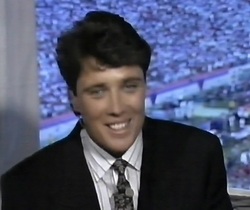
Mick Luckhurst in the booth Super Bowl XXIII
Following the field goal by Mike Cofer that tied the game, Stanford Jennings raced 93-yards straight up the middle of the field with the following kickoff.
The kick-off return caught Luckhurst and Channel 4 slightly off guard. As they were chatting in the booth to the audience, the picture suddenly switched to the field where you heard Luckhurst suddenly wrap up his lead back to NBC with an excited "...and look at the Bengals go!"
The lead was suddenly increased to seven points, 13-6, and in a tight game like this one, a seven point lead was huge.
Sam Wyche watched the kickoff from the sidelines in silence, almost dodging the would be tacklers that seemed to appear in front of him but were in sympathy with Jennings.
The Bengals had taken the lead and should have had momentum. However, although not noticed hugely at the time, in retrospect the slow burning momentum had been lit earlier in the second half by San Francisco's safety, Ronnie Lott.
The Bengals had ran the ball relatively well in the first half. As the 49ers had entered the locker room at half time, one of the first things Walsh had said is that they had to stop the run. They had to stop Brooks and in particular Ickey Woods, who had gained 60 yards in the first thirty minutes and was averaging 4 yards per carry.
Lott was in obvious agreement with his coaches. While watching film himself of Woods, Lott had noticed that no safeties had actually squarely hit the big rookie but instead had tried to tackle him around the waist or legs.
Lott in many ways was the 49ers version of Tim Krumrie and often set the tone for his team with a big interception, or more often than not, a big hit.
Early in the third quarter Lott placed that big hit on Woods, so much so that when Woods initially got to his feet he stumbled backwards slightly. He gained less than twenty yards for the rest of the game following that hit. Many maintain that he was simply not a factor after that and it had not gone unnoticed on the 49ers sideline.
Later in the quarter Lott also laid a huge hit on Woods' fellow running back, James Brooks. Coming from deep in the secondary Lott read the play perfectly and sprinted towards Brooks, wrapping him up and running through him to make the tackle. Underneath it San Francisco's Don Griffin celebrated the hit wildly, obviously fired up by Lott's actions. The feeling slowly spread to other 49ers as the quarter wore on.
As the teams entered the final period, the game would suddenly explode open, as the two teams played out one of the greatest single quarters of football in Super Bowl history, and it was San Francisco who had the momentum.
The kick-off return caught Luckhurst and Channel 4 slightly off guard. As they were chatting in the booth to the audience, the picture suddenly switched to the field where you heard Luckhurst suddenly wrap up his lead back to NBC with an excited "...and look at the Bengals go!"
The lead was suddenly increased to seven points, 13-6, and in a tight game like this one, a seven point lead was huge.
Sam Wyche watched the kickoff from the sidelines in silence, almost dodging the would be tacklers that seemed to appear in front of him but were in sympathy with Jennings.
The Bengals had taken the lead and should have had momentum. However, although not noticed hugely at the time, in retrospect the slow burning momentum had been lit earlier in the second half by San Francisco's safety, Ronnie Lott.
The Bengals had ran the ball relatively well in the first half. As the 49ers had entered the locker room at half time, one of the first things Walsh had said is that they had to stop the run. They had to stop Brooks and in particular Ickey Woods, who had gained 60 yards in the first thirty minutes and was averaging 4 yards per carry.
Lott was in obvious agreement with his coaches. While watching film himself of Woods, Lott had noticed that no safeties had actually squarely hit the big rookie but instead had tried to tackle him around the waist or legs.
Lott in many ways was the 49ers version of Tim Krumrie and often set the tone for his team with a big interception, or more often than not, a big hit.
Early in the third quarter Lott placed that big hit on Woods, so much so that when Woods initially got to his feet he stumbled backwards slightly. He gained less than twenty yards for the rest of the game following that hit. Many maintain that he was simply not a factor after that and it had not gone unnoticed on the 49ers sideline.
Later in the quarter Lott also laid a huge hit on Woods' fellow running back, James Brooks. Coming from deep in the secondary Lott read the play perfectly and sprinted towards Brooks, wrapping him up and running through him to make the tackle. Underneath it San Francisco's Don Griffin celebrated the hit wildly, obviously fired up by Lott's actions. The feeling slowly spread to other 49ers as the quarter wore on.
As the teams entered the final period, the game would suddenly explode open, as the two teams played out one of the greatest single quarters of football in Super Bowl history, and it was San Francisco who had the momentum.
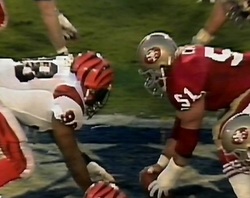
David Grant (left) lines up against Randy Cross
The 49ers had ended the third period with a 32-yard pass to Jerry Rice to their own 46-yard line. On the very first play of the fourth, he found running back Roger Craig for a gain of 40 yards to the Bengals’ 14. All of a sudden and out of nowhere the 49ers had moved 72 yards in two plays and had made it seem effortless.
Cincinnati had the chance to halt San Francisco’s drive soon after when cornerback Lewis Billups let a sure interception of Joe Montana slip through his hands.
"That's the kind (of play) you wake up in the middle of the night dreaming about, " Merlin Olsen remarked from the commentary booth as he and his play-by-play announcer Dick Enberg examined the play.
On the very next play, Montana made him pay.
Joe lobbed a pass to Jerry Rice who was being covered by Billups. Rice snared the pass and ran to the corner of the end-zone. Before going out of bounds he dangled the pigskin over the goal-line. Out of nowhere San Francisco had now replied, and the score was 13-13.
Following a Bengals punt, San Francisco were driving and threatening to score again after yet another spectacular catch from Jerry Rice at the Bengals 38-yard line. However after giving up another big play to the combination of Montana-to-Rice the Cincinnati defense dug in forcing the 49ers to attempt a 49-yard field goal. The kick sailed wide right, Cofer’s second miss of the day.
With the score still deadlocked and with just under nine minutes to play, the Bengals took over possession. Ickey Woods continued to be fed the ball but was not getting the job done as he had in the first half. The amount of pressure that the 49ers’ defense was managing to get on Boomer forced the drive to bog down and Cincinnati sent on Jim Breech to try for his third field goal of the day, this one from 40-yards. The field goal attempt was good and Cincinnati took a 16-13 lead with just under four minutes left to play.
There were cheers and players leaping into the air on the Bengals sideline as the reality set in that they were under four minutes away from a Super Bowl victory. However at least to one Cincinnati Bengal, the reality was different. To Cris Collinsworth the reality was that there was under four minutes left for 49ers quarterback, Joe Montana to lead his team back for the tie and maybe the win. He said as much to Wyche.
As his defensive unit left the sideline for the field Wyche shouted what he could to encourage the unit.
"Play like you're world champions!" he hollered as he paced the sideline quite frantically. "All you got on defense!"
The San Francisco huddle though was anything but frantic.
The 49ers would begin from their own 8 yard line. Montana was about to lead them 92 yards with only 34 seconds left to spare. The drive would take 11 plays and Cool Joe would complete 8 out of his 9 pass attempts. In fact the lone incompletion was a deliberate throw away. It is said that while the San Francisco offense waited for the official to blow his whistle for San Francisco to begin the drive, Montana was pointing out celebrities in the crowd. “Hey look, isn't that John Candy,” tackle Harris Barton recalled him saying. Sure enough there he was. The ref blew the whistle, and Joe said calmly, “Okay, here we go.” He gave his team the play, and off they went.
Behind passes of 8, 7 and 7 yards to running back Roger Craig, tight end John Frank, and wide receiver Jerry Rice, San Francisco moved out from their own goal line. Two carries by Craig gained 5 more yards, before Montana hit Rice for 17 yards and Craig again for a further 13. The 49ers had moved out to the Bengals’ 35 yard line in what seemed like no time at all. An incomplete pass and a penalty for an illegal man down field set up San Francisco with a second-and-20 from Cincinnati’s 45. A 27 yard pass play followed to Jerry Rice and another pass to Craig on the play after set San Francisco up at the Bengals’ 9 yard line. Joe called time out with 39 seconds left in the game.
Just like that the legendary Montana had not only put his team in a position to tie the game - they could now win it. With each successful play, Steve Young could almost hear the bench calling him. As Montana jogged towards the sideline to speak with his head coach and mentor Bill Walsh, everyone in the stadium and everyone at home, on both sides of the Atlantic drew breath and prepared themselves.
Cincinnati had the chance to halt San Francisco’s drive soon after when cornerback Lewis Billups let a sure interception of Joe Montana slip through his hands.
"That's the kind (of play) you wake up in the middle of the night dreaming about, " Merlin Olsen remarked from the commentary booth as he and his play-by-play announcer Dick Enberg examined the play.
On the very next play, Montana made him pay.
Joe lobbed a pass to Jerry Rice who was being covered by Billups. Rice snared the pass and ran to the corner of the end-zone. Before going out of bounds he dangled the pigskin over the goal-line. Out of nowhere San Francisco had now replied, and the score was 13-13.
Following a Bengals punt, San Francisco were driving and threatening to score again after yet another spectacular catch from Jerry Rice at the Bengals 38-yard line. However after giving up another big play to the combination of Montana-to-Rice the Cincinnati defense dug in forcing the 49ers to attempt a 49-yard field goal. The kick sailed wide right, Cofer’s second miss of the day.
With the score still deadlocked and with just under nine minutes to play, the Bengals took over possession. Ickey Woods continued to be fed the ball but was not getting the job done as he had in the first half. The amount of pressure that the 49ers’ defense was managing to get on Boomer forced the drive to bog down and Cincinnati sent on Jim Breech to try for his third field goal of the day, this one from 40-yards. The field goal attempt was good and Cincinnati took a 16-13 lead with just under four minutes left to play.
There were cheers and players leaping into the air on the Bengals sideline as the reality set in that they were under four minutes away from a Super Bowl victory. However at least to one Cincinnati Bengal, the reality was different. To Cris Collinsworth the reality was that there was under four minutes left for 49ers quarterback, Joe Montana to lead his team back for the tie and maybe the win. He said as much to Wyche.
As his defensive unit left the sideline for the field Wyche shouted what he could to encourage the unit.
"Play like you're world champions!" he hollered as he paced the sideline quite frantically. "All you got on defense!"
The San Francisco huddle though was anything but frantic.
The 49ers would begin from their own 8 yard line. Montana was about to lead them 92 yards with only 34 seconds left to spare. The drive would take 11 plays and Cool Joe would complete 8 out of his 9 pass attempts. In fact the lone incompletion was a deliberate throw away. It is said that while the San Francisco offense waited for the official to blow his whistle for San Francisco to begin the drive, Montana was pointing out celebrities in the crowd. “Hey look, isn't that John Candy,” tackle Harris Barton recalled him saying. Sure enough there he was. The ref blew the whistle, and Joe said calmly, “Okay, here we go.” He gave his team the play, and off they went.
Behind passes of 8, 7 and 7 yards to running back Roger Craig, tight end John Frank, and wide receiver Jerry Rice, San Francisco moved out from their own goal line. Two carries by Craig gained 5 more yards, before Montana hit Rice for 17 yards and Craig again for a further 13. The 49ers had moved out to the Bengals’ 35 yard line in what seemed like no time at all. An incomplete pass and a penalty for an illegal man down field set up San Francisco with a second-and-20 from Cincinnati’s 45. A 27 yard pass play followed to Jerry Rice and another pass to Craig on the play after set San Francisco up at the Bengals’ 9 yard line. Joe called time out with 39 seconds left in the game.
Just like that the legendary Montana had not only put his team in a position to tie the game - they could now win it. With each successful play, Steve Young could almost hear the bench calling him. As Montana jogged towards the sideline to speak with his head coach and mentor Bill Walsh, everyone in the stadium and everyone at home, on both sides of the Atlantic drew breath and prepared themselves.

Montana takes instructions on the winning drive
When he came back onto the field, the play he would give his team mates was called “20 halfback curl, X-up.” Roger Craig was the primary target on the play, but if the safety in coverage followed him (which the 49ers expected him to), then receiver John Taylor should be left open. This was a play Walsh had put into the game plan specifically for the Bengals based on what he had seen on the films he had studied while preparing hs gameplan.
Knowing that a field goal would level the scores, San Francisco did not want to risk a turnover here. Craig and fullback Tom Rathman however, lined up on the wrong side of the formation as they were used to swapping into each other's position. Craig realised he was on the wrong side to run his route but decided to do so anyway thinking Rathman would stay in to block from where he was on the field. Rathman meanwhile realising he was in Craig's spot decided he had best run the pass route as he was on the correct side of the formation for the route to be ran.
Despite two blitzing Bengals coming free through the line straight at Montana, the safety did follow Craig as San Francisco expected, giving Montana a narrow line of sight to Taylor. He fired the ball in and the moment is now history as the 49ers had taken the lead with thirty-four seconds remaining. They would kick the extra point to go ahead 20-16, which would be the final score for Super Bowl XXIII.
As the extra point was kicked and the Bengals prepared to receive the kick off so they could muster one last ditch attempt to save the game, Wyche paced around the sideline repeating the phrase "Thirty-four seconds away from it!" several times as he took off and replaced his baseball cap.
The game-winning catch was Taylor’s first reception of the day, while Rice had caught 15 passes for a massive 211 yards (both Super Bowl records) and was named the game’s MVP. Montana himself had a great day completing 23 0f 36 pass attempts for 357 yards and two touchdown passes.
In his book "Stories from the San Francisco 49ers Sideline" Roger Craig stated that the drive at the end of the Super Bowl "demonstrated everything we stood for as a team. Everybody was unselfish and everybody understood his role."
Of course it was Montana who was the leader, and Craig pointed out that it was the little things that he kept reminding his teammates such as "remember get as many yards as possible but hold on to the ball!" during all the chaos that was happening around, with the clock ticking down no less, that made Montana such a leader.
The Bengals did have the thirty-four seconds to try to move down field to score the winning touchdown. They tried valiantly but the last attempt was incomplete and saw Bengals laid all over the field, exhausted, dis-believing and stunned that their dream was over.
During the commotion that followed, Walsh and Wyche found each other in the middle of the field.
"I am the happiest for you I have ever been. Congratulations," Wyche said genuinely to the person he had learned so much from and had been coached by himself when he was a young quarterback. The two men jogged off the field together arms around each other, leaving the herds of photographers, camera men, interviewers and stadium staff behind them. When Walsh was asked of what they said to each other later in the 49ers dressing room as part of the NBC post game he only offered "It was a special moment. I love him (Sam) very much!"
Knowing that a field goal would level the scores, San Francisco did not want to risk a turnover here. Craig and fullback Tom Rathman however, lined up on the wrong side of the formation as they were used to swapping into each other's position. Craig realised he was on the wrong side to run his route but decided to do so anyway thinking Rathman would stay in to block from where he was on the field. Rathman meanwhile realising he was in Craig's spot decided he had best run the pass route as he was on the correct side of the formation for the route to be ran.
Despite two blitzing Bengals coming free through the line straight at Montana, the safety did follow Craig as San Francisco expected, giving Montana a narrow line of sight to Taylor. He fired the ball in and the moment is now history as the 49ers had taken the lead with thirty-four seconds remaining. They would kick the extra point to go ahead 20-16, which would be the final score for Super Bowl XXIII.
As the extra point was kicked and the Bengals prepared to receive the kick off so they could muster one last ditch attempt to save the game, Wyche paced around the sideline repeating the phrase "Thirty-four seconds away from it!" several times as he took off and replaced his baseball cap.
The game-winning catch was Taylor’s first reception of the day, while Rice had caught 15 passes for a massive 211 yards (both Super Bowl records) and was named the game’s MVP. Montana himself had a great day completing 23 0f 36 pass attempts for 357 yards and two touchdown passes.
In his book "Stories from the San Francisco 49ers Sideline" Roger Craig stated that the drive at the end of the Super Bowl "demonstrated everything we stood for as a team. Everybody was unselfish and everybody understood his role."
Of course it was Montana who was the leader, and Craig pointed out that it was the little things that he kept reminding his teammates such as "remember get as many yards as possible but hold on to the ball!" during all the chaos that was happening around, with the clock ticking down no less, that made Montana such a leader.
The Bengals did have the thirty-four seconds to try to move down field to score the winning touchdown. They tried valiantly but the last attempt was incomplete and saw Bengals laid all over the field, exhausted, dis-believing and stunned that their dream was over.
During the commotion that followed, Walsh and Wyche found each other in the middle of the field.
"I am the happiest for you I have ever been. Congratulations," Wyche said genuinely to the person he had learned so much from and had been coached by himself when he was a young quarterback. The two men jogged off the field together arms around each other, leaving the herds of photographers, camera men, interviewers and stadium staff behind them. When Walsh was asked of what they said to each other later in the 49ers dressing room as part of the NBC post game he only offered "It was a special moment. I love him (Sam) very much!"

Just before the snap of 20 Halfback Curl X Up
As Pete Rozelle handed over the Vince Lombardi Trophy to Eddie DeBartolo and Bill Walsh of the San Francisco 49ers (for the last time - Rozelle would announce his retirement in March), he stated, “You and a great Cincinnati team gave us the finest of our twenty-three Super Bowls, I don’t think there is any question about that, and today the 49ers truly established themselves as the team of the eighties.”
The game did prove to be the last for Bill Walsh who retired in the aftermath of the greatest Super Bowl of the eighties. Only years later did he admit that he had made a mistake in retiring when he did and that he wished he had carried on as head coach of the 49ers. Who knows how things would have ended up.
In the book "Genius" by Bill Walsh and David Harris Walsh stated "I should have coached a few more years. I really should have. But it was hard to see it at the time. I didn't have anybody to talk to about it. It wouldn't have taken much to have me stay. I think I had more coaching left."
While some maintain that Walsh simply had to retire due to the emotional strain the 1988 campaign had taken on him, it appears in retrospect that Walsh was almost being pushed out of the door. And this must have been his perception. Most people who were asked about it weighed in saying they expected him to retire, even people from his own organisation.
Everyone wanted him to retire it seemed, apart from him.
His son Craig offered that his (Walsh's) wife "brow-beat" him into the decision saying that if he did not retire she would seek a divorce. Walsh later called his decision to retire "a decision of love."
For all the coaching and help he had offered and given to the many players and coaches that had been through his program, it is quite sad to learn that when he needed much the same as what he had given to so many others, someone to talk to and help him gain perspective on things, it was not available to him.
Joe Montana of course did return. Under new head coach George Seifert he led the 49ers to a 14-2 regular season record and went on to lead his team to a 55-10 hammering of the Denver Broncos in Super Bowl XXIV, being named the MVP as he threw 5 touchdown passes. He could have thrown more but by the final period, his back-up, Steve Young was given the chance to play.
The following season he again led the 49ers to a 14-2 regular season record and they were again in the NFC Championship game looking for their third straight Super Bowl as they faced off against the New York Giants for the right to go to Super Bowl XXV. However late in the game with San Francisco leading, Montana was hit by Leonard Marshall as he rolled out to pass. The hit knocked him from the game and he missed the entire 1991 season. The 49ers incidentally lost the game 15-13. By the time he was ready to come back in 1992 the team was in the firm grip of Young. Joe did start the second half of the final game of the season, a Monday Night game against the Detroit Lions at Candlestick Park, but it was more of a farewell show. By 1993 he was in Kansas City as the Chiefs new quarterback.
The game had been the first Super Bowl Luckhurst had brought to the United Kingdom for Cheerleader. The contest turned out to be one of those rare classic games that surface from the ever flowing lake of NFL history only occasionally.
“Cincinnati were the Cinderella story and the 49ers were in their era of greatness.” the former presenter said nearly twenty years later. “A typical Montana drive bringing it down the field (at the end of the game). For anyone who has followed Montana’s career, it...was...a...classic! It was just a classic Montana drive. 49ers’ drive, west coast offense drive. It was classic timing, classic plays, a classic place. It was classic Montana.”
It most certainly was.
Check out the videos below. They contain various clips of the post-game interviews and offer a good feel for the opposite of emotions felt on each side. There are also interviews from Joe Montana and Sam Wyche as they look back on the classic contest.
[Marcus Lowth September 2015]
The game did prove to be the last for Bill Walsh who retired in the aftermath of the greatest Super Bowl of the eighties. Only years later did he admit that he had made a mistake in retiring when he did and that he wished he had carried on as head coach of the 49ers. Who knows how things would have ended up.
In the book "Genius" by Bill Walsh and David Harris Walsh stated "I should have coached a few more years. I really should have. But it was hard to see it at the time. I didn't have anybody to talk to about it. It wouldn't have taken much to have me stay. I think I had more coaching left."
While some maintain that Walsh simply had to retire due to the emotional strain the 1988 campaign had taken on him, it appears in retrospect that Walsh was almost being pushed out of the door. And this must have been his perception. Most people who were asked about it weighed in saying they expected him to retire, even people from his own organisation.
Everyone wanted him to retire it seemed, apart from him.
His son Craig offered that his (Walsh's) wife "brow-beat" him into the decision saying that if he did not retire she would seek a divorce. Walsh later called his decision to retire "a decision of love."
For all the coaching and help he had offered and given to the many players and coaches that had been through his program, it is quite sad to learn that when he needed much the same as what he had given to so many others, someone to talk to and help him gain perspective on things, it was not available to him.
Joe Montana of course did return. Under new head coach George Seifert he led the 49ers to a 14-2 regular season record and went on to lead his team to a 55-10 hammering of the Denver Broncos in Super Bowl XXIV, being named the MVP as he threw 5 touchdown passes. He could have thrown more but by the final period, his back-up, Steve Young was given the chance to play.
The following season he again led the 49ers to a 14-2 regular season record and they were again in the NFC Championship game looking for their third straight Super Bowl as they faced off against the New York Giants for the right to go to Super Bowl XXV. However late in the game with San Francisco leading, Montana was hit by Leonard Marshall as he rolled out to pass. The hit knocked him from the game and he missed the entire 1991 season. The 49ers incidentally lost the game 15-13. By the time he was ready to come back in 1992 the team was in the firm grip of Young. Joe did start the second half of the final game of the season, a Monday Night game against the Detroit Lions at Candlestick Park, but it was more of a farewell show. By 1993 he was in Kansas City as the Chiefs new quarterback.
The game had been the first Super Bowl Luckhurst had brought to the United Kingdom for Cheerleader. The contest turned out to be one of those rare classic games that surface from the ever flowing lake of NFL history only occasionally.
“Cincinnati were the Cinderella story and the 49ers were in their era of greatness.” the former presenter said nearly twenty years later. “A typical Montana drive bringing it down the field (at the end of the game). For anyone who has followed Montana’s career, it...was...a...classic! It was just a classic Montana drive. 49ers’ drive, west coast offense drive. It was classic timing, classic plays, a classic place. It was classic Montana.”
It most certainly was.
Check out the videos below. They contain various clips of the post-game interviews and offer a good feel for the opposite of emotions felt on each side. There are also interviews from Joe Montana and Sam Wyche as they look back on the classic contest.
[Marcus Lowth September 2015]
NEXT SESSION - ANYTHING ELSE

Ten Times The Weather Really Tried To Stop The Game (But Failed!)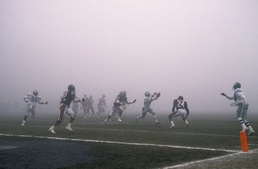
|
THE MONDAY NIGHT MIRACLE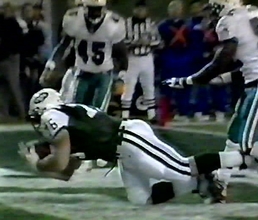
In this On The Sideline featured article we take a look at the Monday Night Miracle, a Monday Night Football game from week 8 of the 2000 season that saw the Miami Dolphins and the New York Jets do battle in one of the wildest contests ever. From the UK point of view the contest literally went on all night CLICK HERE |
